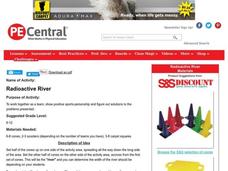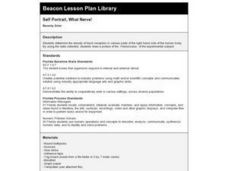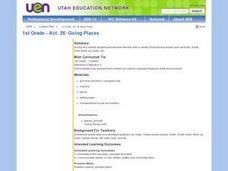Curated OER
Space - In Your Face or Not?
Second graders, in groups, examine how it doesn't matter if they can see the planets in the solar system or not--they're there.
Curated OER
ExplorA-Pond:3rd Grade Probability
Third graders cut a map of a pond into grid squares. They count the total number of squares and calculate the probability of drawing a pond piece vs. a shoreline piece. They draw 10 pieces and compare the results with the original...
Curated OER
Come to Mommy
Fourth graders participate in a simple experiment to illustrate the concept of mother bats identifying their young. They sniff stickers in order to imitate the behavior of mother bats in the wild.
Curated OER
Minefield
Young scholars develop vocabulary and step by step direction skills by completing an obstacle course. Working in pairs students practice giving and receiving directions through a course guided only by oral directions. Young scholars...
Curated OER
Birthday Game
In this birthday game worksheet, students listen as the teacher reads aloud the purpose behind the birthday game, Pin the Tail on the Donkey.
Curated OER
Nutrition: One Hot Topic!
Students learn the content of the food groups and are better prepared to maintain a healthy diet and lifestyle. Students identify the main food groups and list content examples. Students create a cookbook of new and healthy snacks.
Curated OER
Radioactive River
Students work together as a team. Their mission is to get their entire team accross the "river" without having anyone touch the radioactive river. If any member of the team touches the river at any time, the whole team must start over.
Curated OER
Bumper Cars
Students gain trust of fellow classmates. They practice cooperation and spacial awareness. They follow directions given to them by others.
Curated OER
How Sweat Glands Cool Your Body
Students use water and rubbing alcohol to explain how sweat cools mammals' bodies. They write their findings in a journal. After a lecture/demo, students perform a simple experiment that demonstrates this phenomenae.
Curated OER
Radioactive River
Students work cooperatively as a team to cross a "radioactive" river using a scooter and carpet squares. They discuss and analyze their teamwork and cooperation and the different skills used to complete the activity.
Curated OER
Going Places
First graders study directional words such as North, South, East, West, up and down.
Curated OER
Fukuwarai
Students name characteristics shared with other people and those that vary from one person to another.
Curated OER
Empty chairs
Students sit in the middle chair and describe (for a minute or so) the clothes they are wearing. Alternatively, or in addition, members of the group fire questions at the protagonist to get her to describe her clothes.
Curated OER
Self Portrait, What Nerve!
Students conduct an experiment to determine the distance between touch receptor fields in parts of the right-hand side of the body. They enter data into the data table.
Curated OER
Hostages
Students create interpretive drawings and movements based upon the emotion in the poem.
Curated OER
Environment: Going Places
First graders learn directional words and apply this skill to map making. They record their steps on paper.
Curated OER
Peace and Virtue
Young scholars discuss the consequences of improper actions as well as the sense of accomplishment that comes from doing the right thing and helping others. Students divide into two teams and play a game related to the story they...
Curated OER
Memory/Physiology Lab Activity
Students investigate the nervous system and how physical distractions influence mental performance. They work in pairs as a researcher and subject and memorize a series of words with no distractions. After repeating the list of words,...
Curated OER
Goals -- Lesson 2
Students watch the movie "Rudy" and identify his long and short term goals. Individually, they develop a list of their own short and long-term goals and share them with the class. To end the lesson, they discuss how the goals we make...
Curated OER
Holes
Students watch the movie Holes. They list 5 key events from Holes and use a pyramid to rank the events in order of importance to the story. They determine cultural differences between the character and themselves.
Curated OER
Who's There: Acting in the Dark
Students participate in a performance of Macbeth using the lighting techniques that were employed during the Shakespearean era. Working in groups, student reenact a scene. Afterward they discuss the challenges of working with limited...
Curated OER
Habitat Is Home
Pupils are introduced to the concept and components of a habitat. They discuss the key components of a habitat and describe how certain factors can cause disturbances in a habitat and change its population. Activities are leveled for...
Curated OER
Reading Comprehension: When Ants Go Marching, They Count Their Steps
In this comprehension instructional activity, students read a short selection about ants, then answer 5 multiple choice questions. Answers provided.
Curated OER
Famous Figures in History
Young scholars investigate famous people in U.S. history. In this American history lesson, students read about famous people such as Helen Keller and Einstein. Young scholars think of ways they might become famous.
Other popular searches
- Girls Blindfolded
- Obstacle Course Blindfold
- Blindfold Senses
- Blindfolded Puzzle Activity
- Blindfold Games for K 2
- Bandanna/blindfold
- The Blindfold
- Five Senses Sight Blindfold
- Blindfold Trail

























